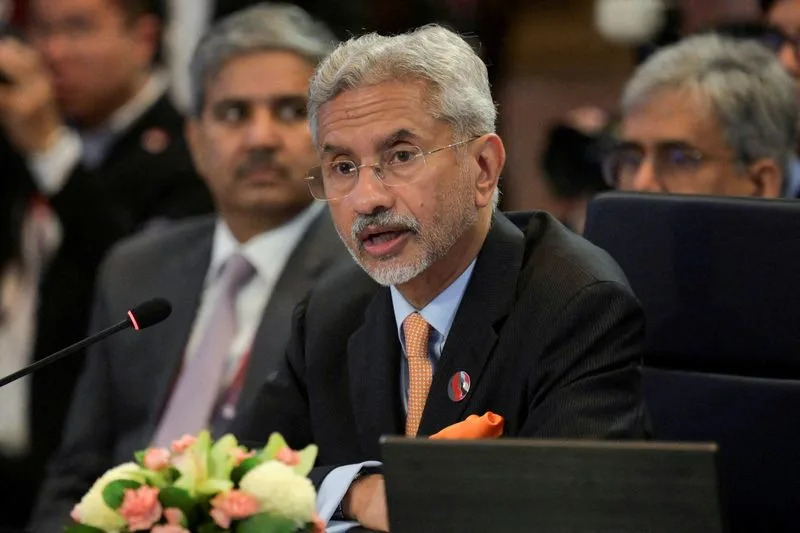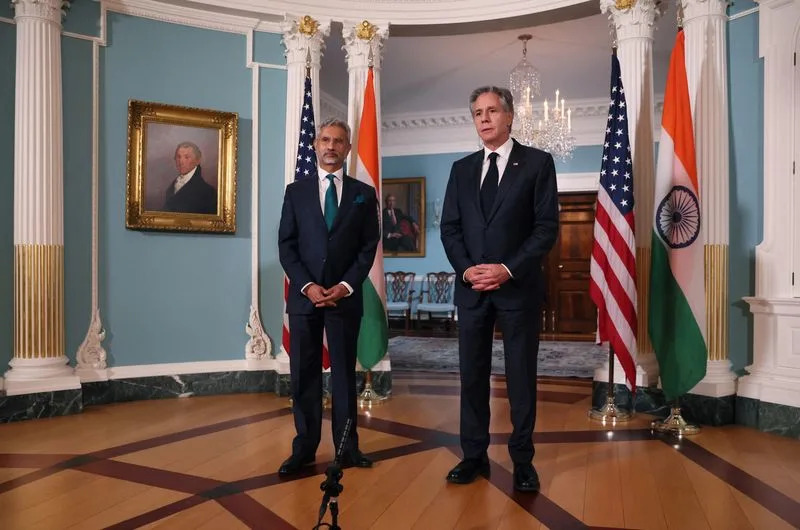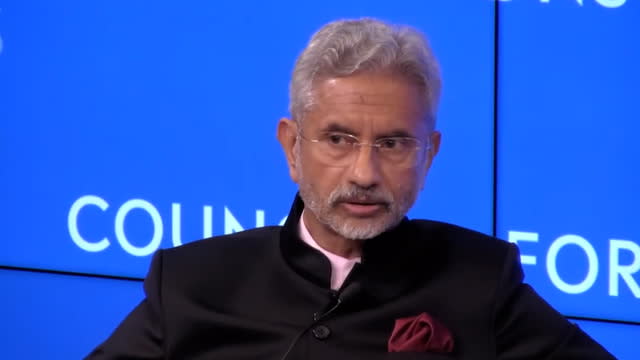Fri, September 29, 2023

FILE PHOTO: Association of Southeast Asian Nations (ASEAN) Foreign Ministers' Meeting in Jakarta
By Kanishka Singh
WASHINGTON (Reuters) - Indian Foreign Minister Subrahmanyam Jaishankar said on Friday there was a "climate of violence" and an "atmosphere of intimidation" against Indian diplomats in Canada, where the presence of Sikh separatist groups has frustrated New Delhi.
"Because there is freedom of speech, to make threats and intimidate diplomats, I don't think that's acceptable," Jaishankar told reporters on Friday evening in Washington.
Relations between India and Canada have been tense of late, mostly due to the presence of Sikh separatists in Canada who have kept alive the movement for Khalistan, or the demand for an independent Sikh state to be carved out of India.
Canada's foreign ministry did not immediately respond to a request for comment.
Earlier this month, Canadian Prime Minister Justin Trudeau alleged that Indian agents may have had a role in the June murder of Sikh separatist leader and Canadian citizen Hardeep Singh Nijjar, who was labeled a "terrorist" by India.
New Delhi dismissed the allegations as absurd. Washington has urged India to cooperate with Canada in the murder probe.
In 2018, Trudeau assured India that Canada would not support anyone trying to revive a separatist movement in India, while repeatedly saying that he respects the right to free speech and assembly of protesters to demonstrate.
Canada is home to an influential Sikh community, and Indian leaders say some fringe groups there remain sympathetic to the cause of an independent Sikh state. The cause hardly has any support in India.
The demand for Khalistan has surfaced many times in India, most prominently during a violent insurgency in the 1980s and 1990s which paralyzed the state of Punjab for over a decade.
The insurgency killed tens of thousands of people and the Khalistan movement is considered a security threat by the Indian government. Sikh militants were blamed for the 1985 bombing of an Air India Boeing 747 flying from Canada to India in which all 329 people on board were killed.
Indian Prime Minister Indira Gandhi was assassinated in 1984 by two Sikh bodyguards after she allowed the storming of the holiest Sikh temple, aimed at flushing out Sikh separatists.
(Reporting by Kanishka Singh in Washington; Editing by Leslie Adler)
Blinken urges Indian cooperation in Canada's Sikh murder probe
Updated Fri, September 29, 2023

U.S. Secretary of State Antony Blinken meets with India's External Affairs Minister Subrahmanyam Jaishankar in Washington, U.S.
By Humeyra Pamuk and David Brunnstrom
WASHINGTON (Reuters) -U.S. Secretary of State Antony Blinken said on Friday he had urged his Indian counterpart to work with Canada to investigate the killing of a Sikh separatist advocate that the Canadian prime minister has linked to Indian government agents.
India's Foreign Minister Subrahmanyam Jaishankar confirmed earlier he had spoken to Blinken and the U.S. National Security Advisor Jake Sullivan about Canadian allegations of New Delhi's possible involvement in the June killing of Hardeep Singh Nijjar in Canada.
Blinken met with Jaishankar at the State Department on Thursday afternoon.
"We're very concerned about the allegations that have been raised by Canada, by Prime Minister Trudeau," Blinken told a news conference after a meeting with Mexican officials.
"We have been in close contact with Canada about that and at same time we have engaged with the Indian government and urged them to work with Canada on an investigation," he said, adding that he repeated the call in his meeting with Jaishankar.
"Those responsible need to be held accountable and we hope that our friends in both Canada and India will work together to resolve this matter," Blinken added.
A State Department spokesperson said that in the meeting Blinken had urged India to cooperate "fully" with the ongoing Canadian investigation.
Ties between Indian and Canada have become seriously strained after Trudeau told parliament this month that Canada suspected Indian government agents were linked to the murder.
The incident has put the United States in an awkward spot diplomatically, caught between its neighbor and close ally Canada and India, which Washington has been courting as a key partner in its effort to push back against expanding Chinese influence.
An official State Department readout of the meeting between Blinken and Jaishankar issued on Thursday made no mention of the Nijjar issue, but an unnamed U.S. official subsequently confirmed late on Thursday that it was raised in the meeting.
On Friday, a State Department spokesperson said that during their meeting, the two "discussed a full range of issues impacting the important, strategic, and consequential relationship between the United States and India" and that the key issues were noted in the official readout.
Speaking in Quebec on Thursday, Trudeau said he was certain that Blinken would broach the issue with Jaishankar.
Nijjar was a Canadian citizen but India had declared him a "terrorist." He supported the cause of Khalistan, or an independent homeland for Sikhs to be carved out of India.
Jaishankar said on Tuesday New Delhi had told Canada it was open to looking into any "specific" or "relevant" information it provides on the killing.
Trudeau, who has yet to publicly share any evidence, said last week he shared the "credible allegations" with India "many weeks ago."
Blinken and Sullivan said last week that Washington was "deeply concerned" about the allegations raised by Trudeau.
The U.S. ambassador to Canada told Canadian television that some information on the case had been gathered by the Five Eyes intelligence alliance, which groups the U.S., Canada, Australia, New Zealand and Britain.
(Reporting by Humeyra Pamuk and David Brunnstrom; Writing by Doina Chiacu; Editing by Caitlin Webber, Daniel Wallis and Don Durfee)
Blinken raises Sikh leader’s murder in meeting with Indian foreign minister Jaishankar
Alisha Rahaman Sarkar
Fri, September 29, 2023

US secretary of state Antony Blinken reportedly asked Indian foreign minister Subrahmanyam Jaishankar to cooperate with Canada's investigation into the killing of Sikh separatist leader Hardeep Singh Nijjar.
Ties between India and Canada plummeted after prime minister Justin Trudeau accused the Indian government of involvement in the killing of the Canadian national.
Nijjar – a designated terrorist in India – was assassinated in Surrey on 18 June by two masked men. He has been linked to the secessionist Khalistan movement, which calls for a separate homeland for the Sikh religious community to be carved out of India's Punjab state.
India vehemently denied what it called an "absurd" allegation, adding it was not New Delhi's "policy" to be involved in assassination on foreign lands.
“Blinken raised the Canadian matter in his meeting, (and) urged the Indian government to cooperate with Canada’s investigation,” Reuters quoted a US official as saying, though a State Department statement made no mention of the issue.
Mr Trudeau has been reportedly mounting pressure on Canada's "Five Eyes" intelligence-sharing allies to push India into cooperating with the investigation.
The prime minister on Thursday said he was certain that Mr Blinken would broach the issue with India's Jaishankar.
The US State Department’s formal statement on its website after Mr Blinken’s meeting with Mr Jaishankar made no mention of Nijjar’s murder or of Canada.
A readout from the State Department listed points like India's G20 presidency, the creation of an India-Middle East-Europe corridor, defence, space and clean energy as topics of conversation between the two.
Mr Jaishankar on Tuesday said New Delhi has told Canada it was open to looking into any "specific" or "relevant" information it provides on the killing.
Mr Trudeau, who is yet to publicly share any evidence, said last week he shared the "credible allegations" with India "many weeks ago".
Mr Blinken and national security adviser Jake Sullivan said last week the United States was “deeply concerned” about the allegations raised by Canada.
India has responded to the allegation by suspending visa services in all categories for Canadian nationals citing “security threats” to its consulates. Each country expelled one senior diplomat from the other in a tit-for-tat move.
A group of hackers called the “Indian Cyber Force” claimed responsibility for temporarily taking over the official website of the Canadian Armed Forces on Wednesday.
"That's a very common thing that happens, unfortunately, often. But our cyberofficials and security officials acted very, very quickly," defence minister Bill Blair told reporters.
No comments:
Post a Comment